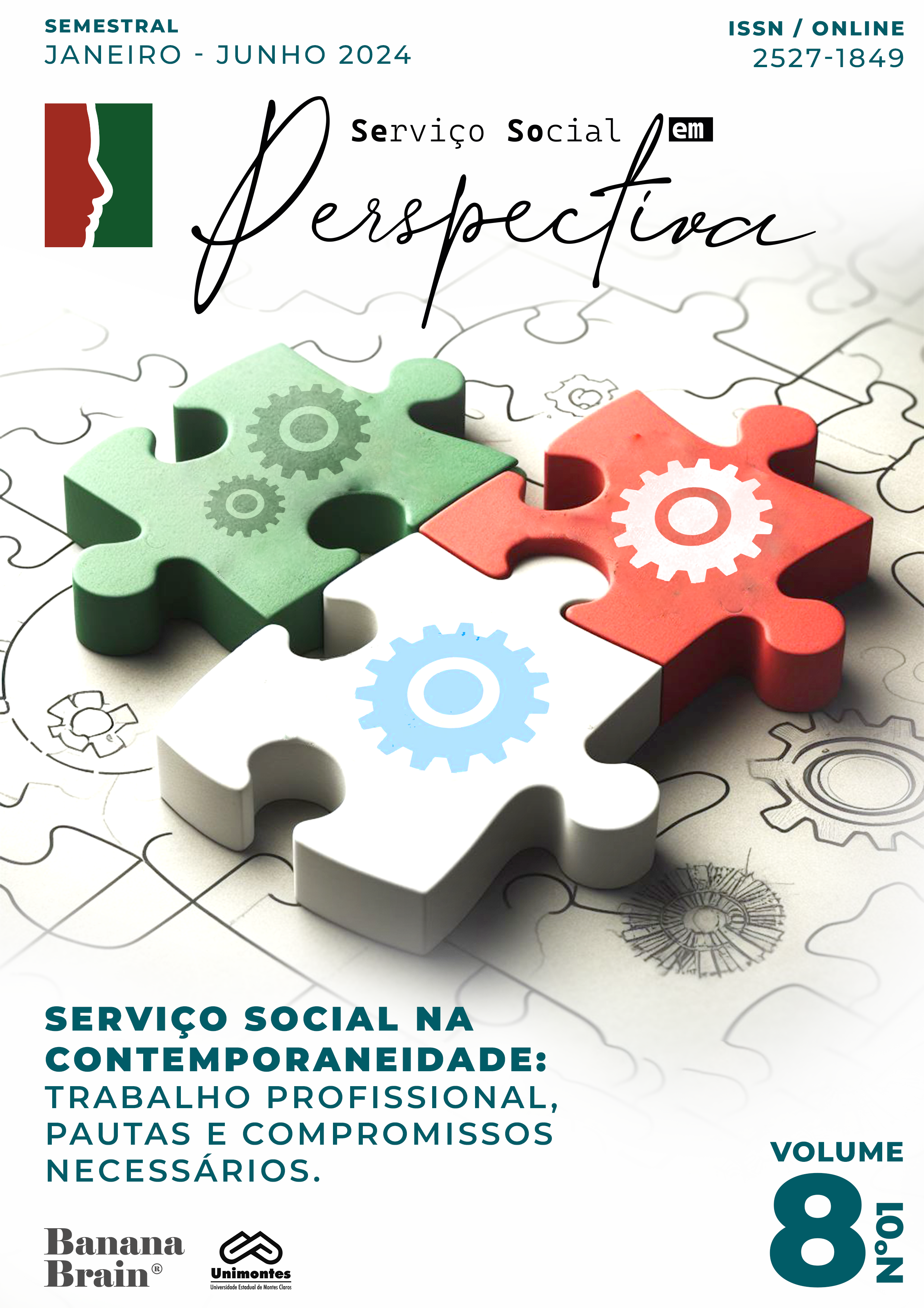CÓDIGO DE ÉTICA PROFISSIONAL DA/O ASSISTENTE SOCIAL
AUSÊNCIAS, APAGAMENTOS E INVIZIBILIZAÇÕES DA QUESTÃO RACIAL NEGRA NAS SUAS FORMULAÇÕES E ATUALIZAÇÕES
DOI:
https://doi.org/10.46551/rss202407Keywords:
Código de Ética Profissional, Assistente Social, Questão Racial, RacismoAbstract
The objective of this work is to identify the absence of discussion of the racial issue in the updates of the Code of Professional Ethics of the Social Worker to the detriment of other updates carried out, despite the inclusion of several Social Work professionals in organized black social movements. I present some reflections on this absence, highlighting how this Code dealt with the racial issue in its formulation, pointing out some elements of analysis in order to seek to understand the historical and political context that led its formulation to disregard the racial dimension in its elaboration. In this sense, bibliographical/documentary research is presented as one of the research strategies and methodologies capable of meeting the objectives outlined, which was carried out from digital documents available on the website of the Federal Council of Social Service (CFESS) and other electronic sites that make files available digitally with official documents from other institutions. Despite recognizing that the advances historically present in the revisions of the professional Code of Ethics of Social Workers are undeniable, it is also inferred that the need for constant updating is undeniable, considering the speed with which society moves, updates itself, review and reset. Topics such as racism, LGBTQIAPN+phobia, religious intolerance, religious racism are increasingly frequent and require immediate responses from social workers to address these issues that are so relevant to the social relationships that are established in our society.
Downloads
References
ABRAMIDES, M. B. C. O Projeto Ético-Político do Serviço Social brasileiro: ruptura com o conservadorismo. São Paulo: Cortez, 2019
BARROCO, M. L. S. Ética e Serviço Social: fundamentos ontológicos. São Paulo: Cortez, 2001.
BRASIL. Lei n. 8.662, de 7 de junho de 1993. Dispõe sobre a profissão de Assistente Social
e dá outras providências. Brasília: 1993. Disponível em:
http://www.cfess.org.br/arquivos/CEP_CFESS-SITE.pdf. Acesso em: 30 mai. 2023.
CASHMORE, E.; BANTON, M (et al.). Dicionário de relações étnicas e raciais. Trad. Dinah Kleve. São Paulo: Selo Negro, 2000.
JESUS, C. M. (1914-1977). Quarto de despejo: diário de uma favelada 10. ed. - São Paulo: Ática, 2014.
CFESS, Conselho Federal de Serviço Social. Código de Ética da/o Assistente Social. (Edição Trilingue). 10ª Edição Revista e Atualizada. Brasília: CFESS, 2019.
______. Perfil de Assistentes Sociais no Brasil: formação, condições de trabalho e exercício profissional. Brasília: CFESS, 2022.
______. O CFESS. Disponível em: http://www.cfess.org.br/visualizar/menu/local/o-cfess. Acesso em: 30 mai. 2023.
______, BARROCO, M. L. S.; TERRA, S. H. (orgs.). Código de Ética do/a Assistente Social comentado. São Paulo: Cortez, 2012.
EURICO, M. C. Da Escravidão ao Trabalho Livre:: contribuições para o trabalho do assistente social. SER Social, [S. l.], v. 19, n. 41, p. 414–427, 2018. DOI: 10.26512/ser_social.v19i41.14947. Disponível em: https://periodicos.unb.br/index.php/SER_Social/article/view/14947. Acesso em: 30 maio. 2023.
GONÇALVES, R. Quando a questão racial é o nó da questão social. Katálysis, Florianópolis, v. 21, n. 3, p. 514-522, set./dez. 2018. https://doi.org/10.1590/1982-02592018v21n3p514.
LIMA, T. C. S.; MIOTO, R. C. T. Procedimentos metodológicos na construção do conhecimento científico: a pesquisa bibliográfica. Katalysis, Florianópolis, v. 10, n. Especial, p. 37-45, jan. 2007. Disponível em: https://www.scielo.br/pdf/rk/v10nspe/a0410spe.pdf. Acesso em: 09 jun. 2020.
NASCIMENTO, G. Racismo linguístico: os subterrâneos da linguagem e do racismo. - Belo Horizonte: Letramento, 2019.
OSÓRIO, R. G. A desigualdade racial no Brasil nas três últimas décadas. Instituto de Pesquisa Econômica Aplicada - Brasília: Rio de Janeiro: Ipea, 2021.
Downloads
Published
How to Cite
Issue
Section
License
Copyright (c) 2023 Revista Serviço Social em Perspectiva

This work is licensed under a Creative Commons Attribution-NonCommercial 4.0 International License.











